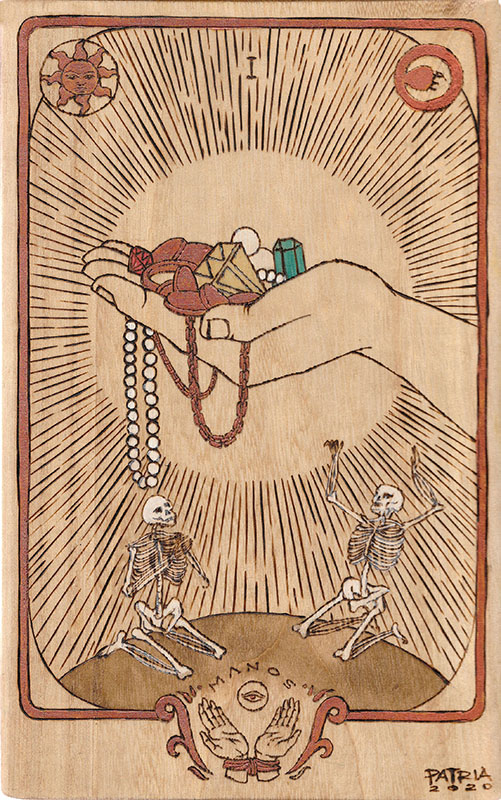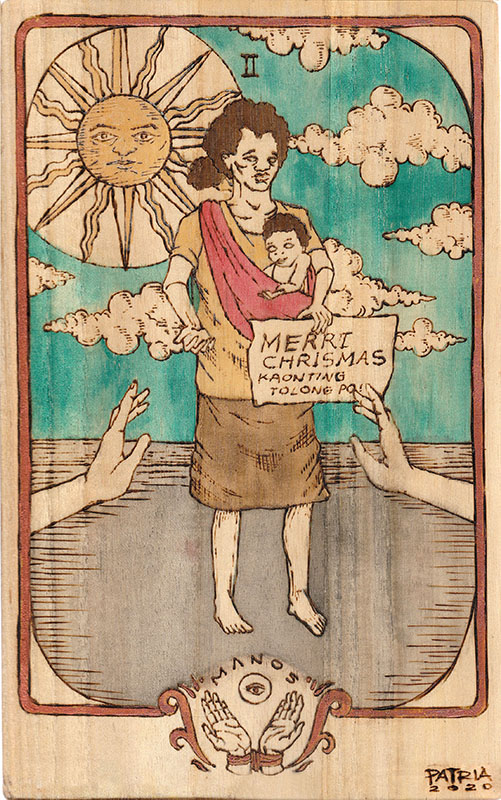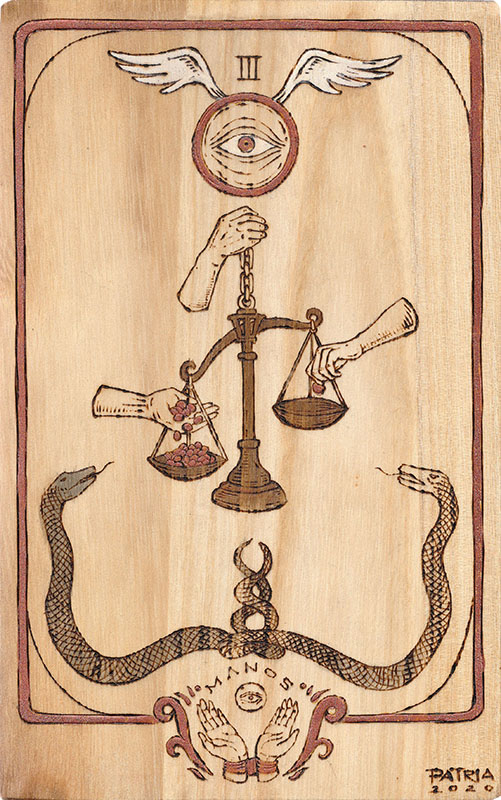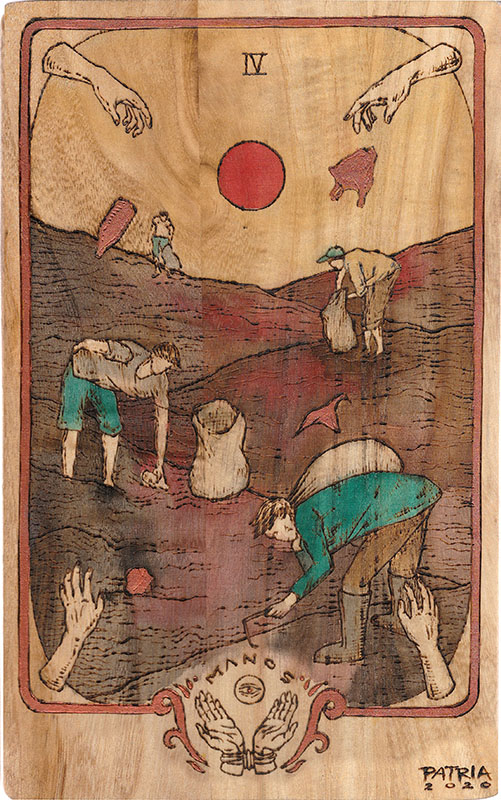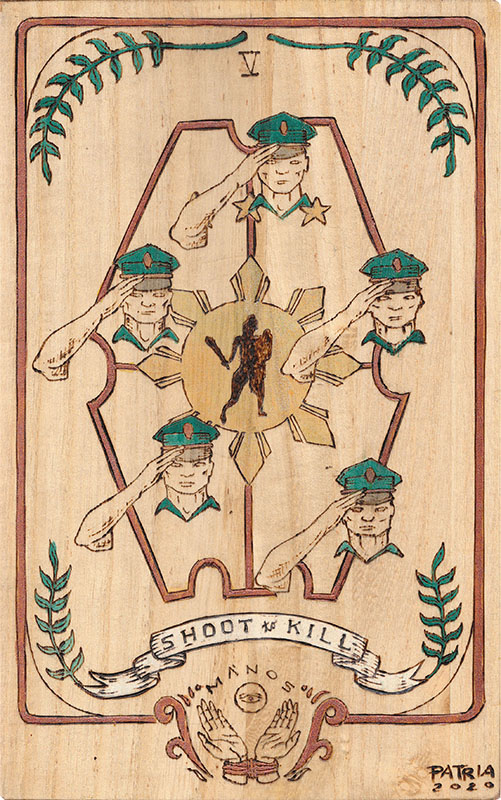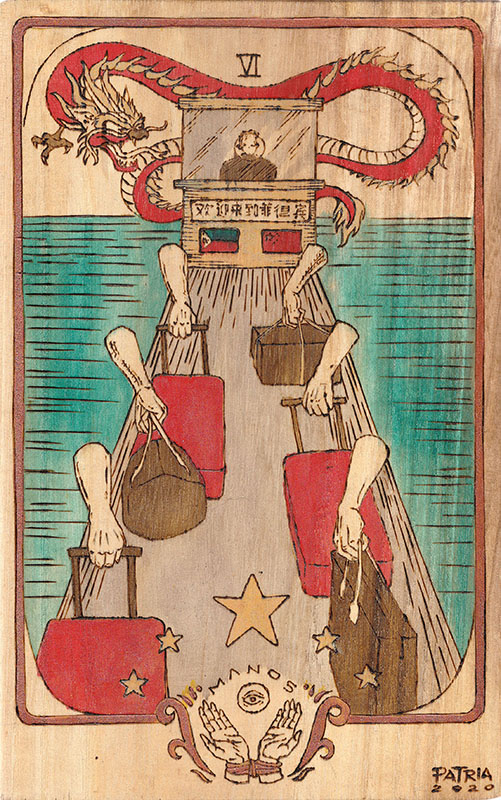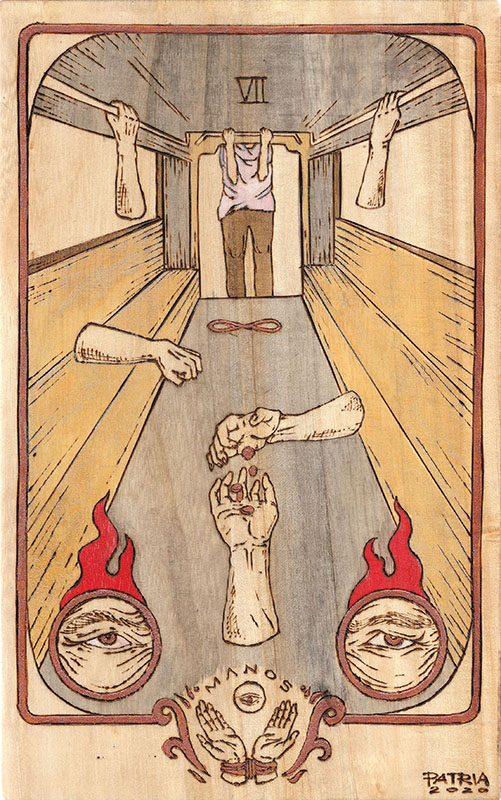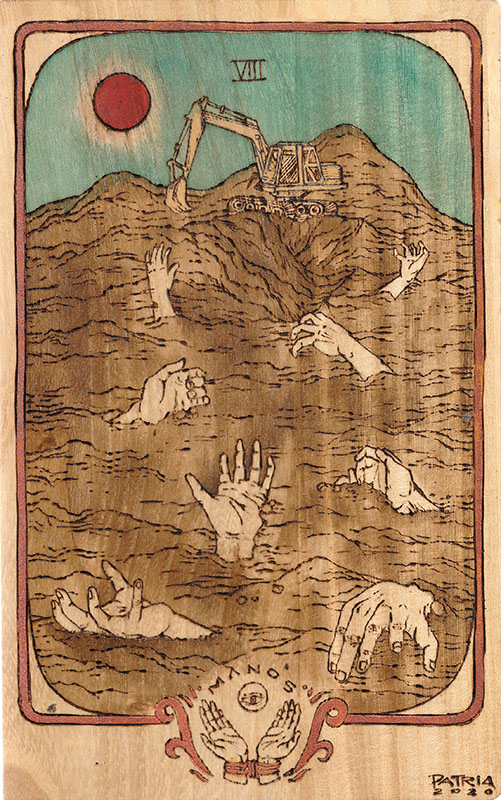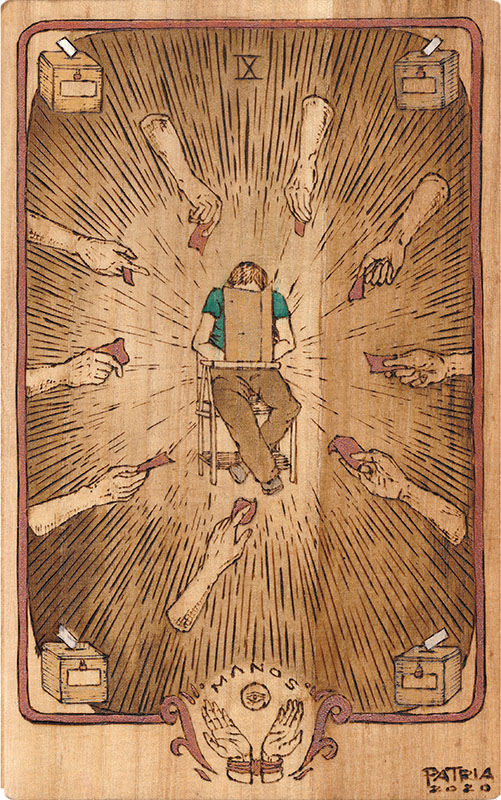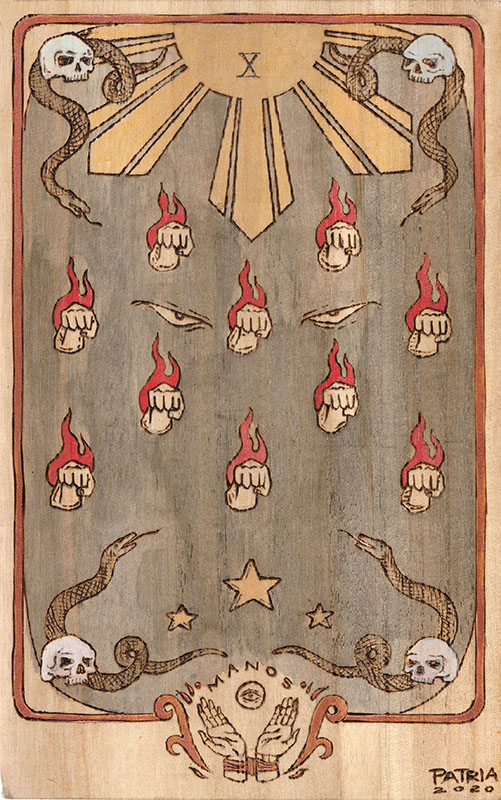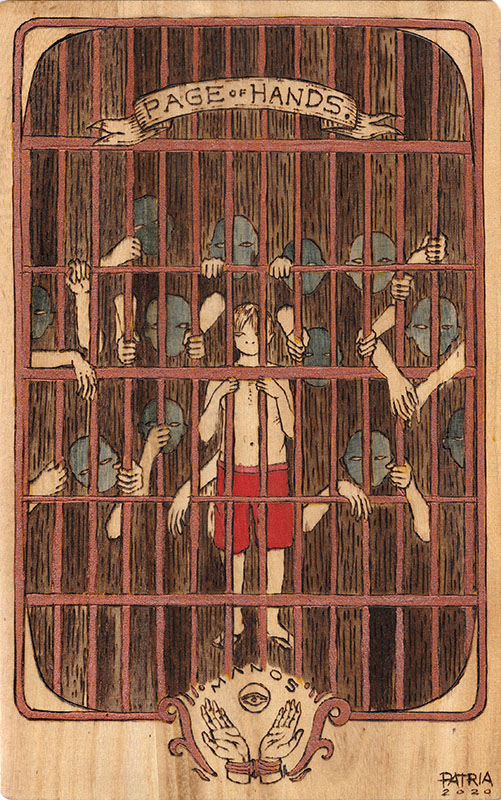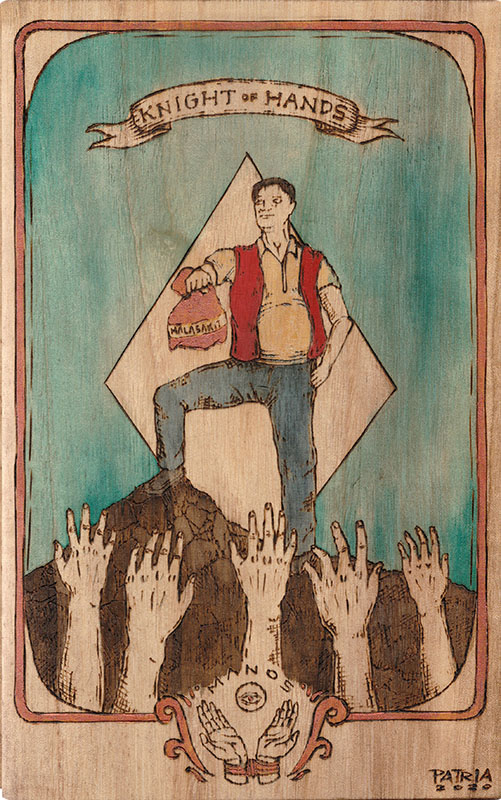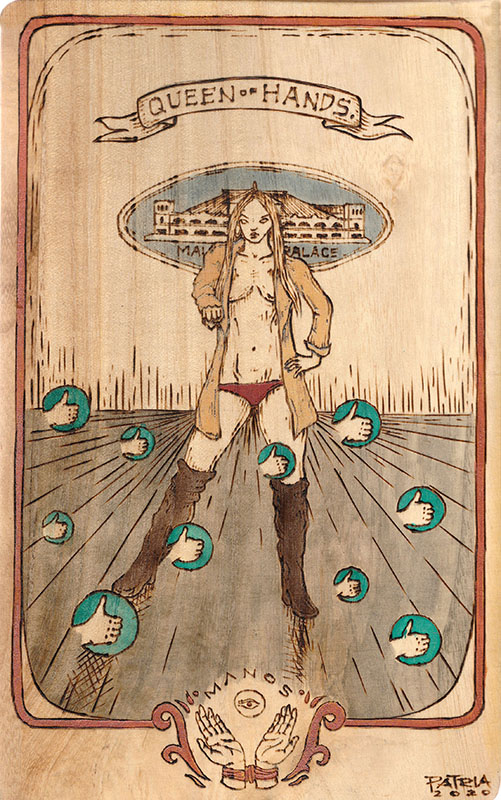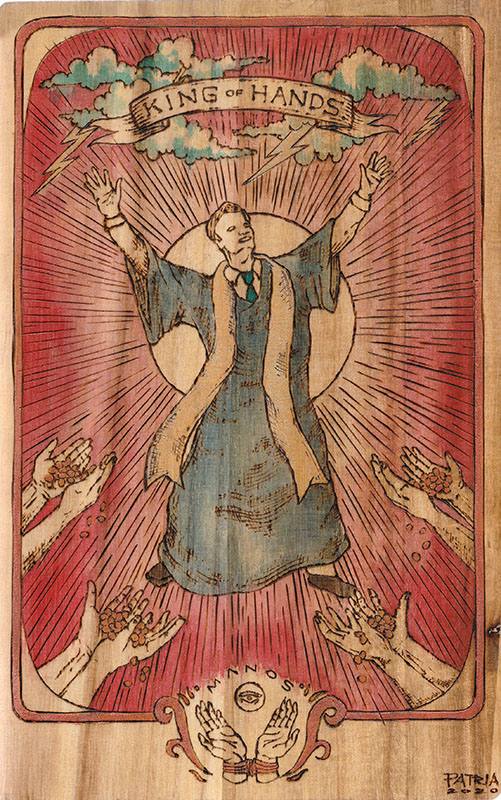The First of the Los Indios Filipinos Minor Arcana
Common reception toward the tarot is split in two. Either it is a means to plumb the depths of the unconscious mind, have it manifest, and map the Querent’s road ahead, or it is of another order altogether, in the company of reading tea leaves and bones, a way by which each card is an expressive component of a fluid whole.
This pictorial key for the suit of Hands takes into consideration the latter; its symbolisms are allegories to present Philippine society: its politics, plight, and the forms of worship tangled thereto. In the old as in the new suits of the tarot, there are ten numbered cards and a Court tetrad. Manos, Spanish for “Hands,” finds a connecting thread in our colonial past, while the imagery draws its force from recent events, notable figures, and everyday occurrences.
Like the Pentacles suit—also called “Coins” or Deniers or Money, all prototypes of the modern Spades—the cards of Manos pertain to worldly affairs: material and sensual pleasures, success, and prosperity, as attained through its associated element, Earth. The cards reveal Conditions of Life: one’s surroundings and, indeed, how one makes do with the resources available. On more esoteric terms, the iconography of hands extols the existence of other people, their various modes of exchange, and the ways through which sociality manifests by these actions.
Like all forms of divination, the tarot is concerned with problems of the future. In turn, this suggests a specific philosophy of history. When read separately or in a numerical sequence, Manos envisions the future as that of disquiet, in which there are set classes and roles in an unchanging hierarchy. When read synchronously—that is, together, spontaneously, as in spreads during a reading—the organization is reshuffled, and the tarot comes to resemble more closely a game of hazard, the cycle exemplified by the ouroboros, the dragon eating its own tail.
With the conditions set by the “Earth,” agents rise to an occasion, fuse or assemble into groups, and then disperse; the totalizing principle is impartial to whom. It is a game of hazard by which a performer takes a seat in office, or a man claims his right to divinity. The charitable man today may, in other circumstances, steal tomorrow. It becomes less a question of what one has and more about what any one person can do. It is this suit’s primary characteristic: how, like a hand, one can reveal as much as conceal, divert by sleight, or issue freely.
Ace of Hands
A single hand emerges from a colorless sky, issuing riches freely available. Providence: as if every beam of light had been chased into these mineral prisms and glass beads, exhibiting colors so radiant they pale and soften the sun. The barren land recedes from sight at this fortune; this fortune so grand it awakens the dead.
Divinatory meanings: New ventures, promises fulfilled, rejuvenated health
Reversed: void ambition, lost opportunities, abuse of power.
II of Hands
A barefoot woman cradles her child as she requests for alms. Though she is astray, the lush lands of her origin beckon just past the horizon; the sun watches over her, as does the cerulean sky. Two hands raise before her in even disposition; it is unclear as to whether the gesture is to dismiss, halt, or provide aid.
Divinatory meanings: reassessment, material trouble, vagrancy
Reversed: suspense, delay, abuse of power
III of Hands
Hovering at the topmost of this card is a winged eye, but it is the snakes who hold vigil. The scales tip in favor of the hand who has plenty and the hand that wields it. The object is not to achieve balance, but to manage the act; at the bottom, twined snakes lie in wait for the one that does not check its excesses.
Divinatory meanings: normalcy, security, regulation
Reversed: exaction, material or sensual poverty, abuse of power
IV of Hands
A wide, barren domain extends and shapes the horizon; a red sun glows sickly. A dry season. The keepers are in a preparatory stage, working individually to prime the land. One may stumble upon a chance discovery.
Divinatory Meanings: Luck, noble service, self-sufficiency
Reversed: Poor strategy, sterility, abuse of power
VII of Hands
Seven hands occupy a vehicle interior, with each a designated space. Four fasten themselves as a form of durance; two pay their wages. A reversed figure 8 lays by the entry, suggesting a covert connection, an endless bond.
Divinatory Meanings: Conviviality, movement, service
Reversed: meagre profits, a gradual dwindling, abuse of power
Page of Hands
The Page of Hands tightens his grip, examining, quietly, the rigidity of his cage. Behind him are a group of shadowed, masked figures. He looks forward: it is through a narrow gap between the steel bars that he ponders his future.
Divinatory Meanings: Foresight, precocity, an awakening
Reversed: truncated ventures, stunted development, abuse of power
Knight of Hands
The Knight of Hands stands atop higher ground, his cleanliness, delineated by the diamond frame. He holds a bag of relief goods steadily above the mass of hands before him. He is in no hurry. He looks beyond their thin frames. A prospector, he rests his view on the lay of the land.
The Knight of Hands is one who offers aid when the need arises, or when convenient.
Divinatory Meanings: Discernment, charity, Help from Higher Places
Reversed: Reluctance, inaction, abuse of power
Queen of Hands
With one hand resting on her hip, the other outstretched into a fist, the Queen of Hands attributes admiration with sensual pleasure. Clad in scant clothing, her appearance distracts from her pursed lips. Her brazen personality may be mistaken for integrity and truth.
Crafty and driven, the Queen of Hands appeals to pathos, often twisting and contorting her words to suit a power that she herself does not wield. Her back is turned so she may face her audience; her duty is to elicit reactions.
Divinatory Meanings: Widespread favor, influence, social ascent
Reversed: False testimonies, prevarication, abuse of power
King of Hands
A spiritual successor to Midas, the King of Hands stands between his subjects and the white sun. Through mighty gestures, the King of Hands summons storm clouds and conjures gold out of thin air unto the hands of his believers; the shadows he casts expands his aspect. Dressed in simple garb, he inspires pious modesty. Closer inspection reveals a formal tie that connects beneath his robe, suggesting an enterprising, possibly deceptive personage.
The Querent should be wary of promises made by the King of Hands. This is a man who performs miracles to undo the disasters he himself orchestrated. Gifts from him are bargains in disguise. His claim to divinity is theater.
Divinatory Meanings: Providence, material prosperity and abundance, transient security.
Reversed: Delusions of grandeur, obsession with wealth, abuse of power.
About the Artist
Iya Regalario is a visual artist based in the Philippines focused on illustration, wood pyrography, installation, and public art. She considers her art as an expression of socio-political and cultural environments that continue to shape her identity as an artist. Her art practice strives to maintain a creative balance between studio work, research, and community to be able to imagine concepts around philosophical thought and current social issues.
She had her first solo exhibit entitled Don’t Forget to Breathe in 2014 at Altro Mondo Contemporanea, which was followed shortly after by De Anima in Kaida Contemporary. Her next solo shows were Purveyors of the Preferred View (2017) and Naïveté (2019), which were held in Altro Mondo and Metro Gallery, respectively. She has also joined several group shows in the Philippines and has participated in several local art festivals, including the Malasimbo Music & Arts Festival (2013-2016), Manila Biennale (2017), and the Ibagiw Art Festival (2019).
Learn more about Iya through her website.
Iya Regalario’s exclusive release of Manos: Suit of Hands continues until January 15, 2021. For inquiries, click here.


